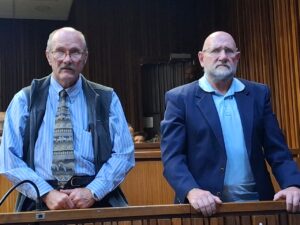By: Clyde Ramalaine
A legacy of the whole human, fallible and tempted just not a deity –
What is it with death that we must lose our capacity, to be honest, our sense of critical engagement, and our attempt at objectivity? Why do some at the visitation of death attempt abusing culture to be muzzled into silence because someone has decided all reflections must be of a particular type?
On Boxing Day 2021, emeriti Anglican Archbishop Desmond Mpilo Tutu transitioned from this space and place we all know as our home. At four score-and-ten and given the frailty of age, even though his struggle in ill-health was public, we knew at some point we needed to bid farewell to a unique soul raised in Munsieville Krugersdorp. A human being that left the dusty roads of Munsieville and traversed the globe in the convicted quest to rally support against the heretic apartheid system. It was not a matter of we did not expect it. Desmond Mpilo Tutu, the pint-sized in physical stature, but a giant in public presence, lived.
The haters never can deny that Tutu made his outstanding and publicly known contribution to the anti-apartheid struggle of South Africa as an Anglican cleric who made noble choices. It is an indisputable fact that cannot be downplayed or willfully ignored. Tutu must be celebrated and respected for his role in that frame. Beyond statutory apartheid, he must also be recognized for speaking truth to power on several occasions. He must also be observed in the same fashion as all others who equally made such costly choices to take a stand against apartheid, many of whom not one page as yet has been written.
Should Tutu be compared to the colossus of a German Theologian and Scholar Dietrich Bonhoeffer for his undeniable theological contributions perhaps not because Tutu does not define the typical theological scholar but as a true liberation activist that made noble choices under apartheid willing to risk everything. We will not find his unique epistemology or prism captured in existential philosophical thought on the Christian faith or any of the fundamentals of the Christian doctrine, but we find a man in the trenches of the South African liberation inspired by his convictions on the error of apartheid and the plight of injustice active to call out the wrongs.

Yet celebrating the life and times of Tutu cannot translate to a forced managed account for whatever agenda. It cannot be at the expense of rightfully acknowledging Tutu for his equal public and apparent private shortcomings because that would be a disservice of a celebration of a man who lived in our space. It dares not be cradled by dishonesty. Thus, I contend that Desmond Tutu, in his death both unites and divides as he did in life. Tutu united us in the course of a necessary liberation struggle essentially from the early ’80s.
The Tutu we knew never disowned his controversiality, be that in his faith- persuasion, either in the historical or evolved state. We know Tutu was comfortable with his admirable quest for liberation and his articulations on gender, race, and environment. He was equally comfortable with his silence on the land question, the subject of a necessity of economic redress from white monopoly capital. He did not reprimand nor question the buffer-zone crop of ANC leaders who became filthy rich, many of them claiming a right to speak as moral meridian when they remain financially dry-cleaned by apartheid beneficiary elites.
Unfortunately, in the aftermath of his transitioning, too many think and believe it is their inalienable right to be intolerant towards views that show their celebration of Tutu as veneered in one-sidedness. The intolerance to opposite opinions that started from the time of a public announcement of his demise has for a week long-continued, and we must surmise will for an extended period do so. The intolerance of some negates a healthy and safe discourse. Columnist Nadine Dreyer dubs him the “Survivor who had the last laugh”. Journalist Chris Barron calls him the “Saviour of the People”. Dr. Piet Meiring calls him, “Die laggende profeet”, and praises Tutu’s uncritical acceptance of an entirely inadequate and self-serving apology for the theology of apartheid by the Dutch Reformed Church (NG Kerk). Former 702 Talk-show Anchor Eusebius Kaiser wants to lay two canards to rest defending Tutu’s legacy as active in non-racialism yet still does not help us celebrate Tutu in humanity. In what appeared to be a contest of the ‘global greatest’, Mathe on Facebook tried to tell us Tutu was more significant than others because of his global stature. Others point-blank refuse to entertain his jagged-edged contradictions, which define his humanity and personal wrestle of an evolving and thinking being.
Somehow, we are brow-beaten to buy into the sponsored narrative that his stand against apartheid coupled with reprimanding of those mainstream media declared persona non-grata renders one as above reproach. I guess if you can condemn some obvious, ANC leadership, you are a deity. In this atmosphere sense and reason evaporate and must make way because the self-appointed gurus on Tutu must alone speak. They did the same with Mandela. He became an icon that South Africans refused to critique and engage thus deified. Perhaps more disturbing is the arrogated right some claim to be natural defenders of his legacy when we all lived through and shared since the actor was public and we so-journeyed.
Why is it necessary for them to seek to defend Tutu? Perhaps we must ask, is there a need for such hegemony of celebration and in whose interest is such? Some seek to eke out relevance and merely abuse Tutu for their personal few minutes in media limelight interests. Tutu is a human hero as an activist against apartheid. He is a respected Anglican Church cleric who chose to take a stand on several thorny issues – but he was not the final authority on morality or what was right and wrong. He didn’t always act in the intents of the greater good but his personal political and global image interests.
Why is it necessary to defend Tutu’s legacy in this impoverished and myopic sense? Tutu lived, made his undeniable contribution, and perhaps needs no defence because he was public and verbal for the most part. He was a complete human with incredible highs and demoralizing lows depending on where you stand and what you know. Why can’t these known paradoxical contradictions, ordinarily accepted for all humans, apply in consistency for Tutu? Why must Tutu be absolved and stripped from the frailty of an alter-ego, the struggle of the Martin Luther King junior drum-majorette instinct, and the known tendencies that border on self-interest? By his own admission, he was no deity, and no number of interventions in the blindness of semi-worship will alter that.
We represent different generations living in the same space with Tutu. We saw him defy apartheid and challenge post-apartheid ANC leadership. But we also saw him in shades of self-interest, seeking his will to force people like the late Winnie Madikizela-Mandela and others to confess. We saw how he threatened to invoke God as if he had an inalienable right to do that. Why must we at his death airbrush his belittling, blackmail, and painful insult against Winnie Madikizela-Mandela, which Tutu never did with any of the Apartheid whites whose hands dripped with blood?
Shall we forget how apartheid special branch Warrant Officer Nick Deetlefs was implicated in a litany of torture and apartheid crimes against Neil Aggett and Carl Niehaus and others? The TRC invited Niehaus to participate in the reconciliation process, which he rejected. Tutu then called Niehaus and insisted Niehaus comes to forgive Deetlefs. When Niehaus expressed his objection to such an act anchored in his theological traditions Tutu attempted to blackmail Niehaus, resorting to playing the Christian card of forgiveness, thus patronizing Niehaus. Niehaus unequivocally told Tutu that the cleric was confusing justice and reconciliation. This led to a breakdown of relations that never were mended.
We dare not forget how Tutu chose to sacrifice justice for his obsession with forgiveness at a TRC process that continued to render black lives cheap. Why is it a sin to admit he oversaw a flawed process in which whites dictated the outcomes favouring them where they walked away unscathed? Why is it wrong to admit that, unfortunately, Tutu usurped and became the TRC when we still do not know the truth or have justice?
We saw the duality of his expressed morality and flaw in January 2012 when he took umbrage and acted to reprimand South Africans for labelling a white racist and rapist gross gender-based violent offender Johan Kotzé, [The Modimolle Murderer] a monster. Let us hear Tutu in his own words: “He [Kotze] may indeed be guilty of inhuman, ghastly and monstrous deeds, but he is not a monster. We are actually letting him off lightly by calling him a monster because monsters have no moral sense of right and wrong – and therefore, cannot be held morally culpable cannot be regarded as morally blameworthy.” He added: “[Kotzé] remains a child of God with the capacity to become a saint.” His theology here could have stood if there was any evidence that Tutu also traversed the racial diaphragm in defending a black perpetrator guilty of the same crimes; unfortunately, there is no record that he ever did. Thus, we are left with an ambivalence. Instead of uniting us, it divides us. It renders him in icon status as a suspect in a post-statutory apartheid space not to reprimand whites but quick to rebuke blacks when he was silent when many similar black criminals were labelled ‘monsters.
When it is talked about Archbishop Desmond Tutu, we all celebrate him for his admirable stance against corruption, which cannot be denied or downplayed. Yet, some of us want to know if he knows what happened to millions of Rands of aid money intended for the struggle? If he remotely ever handled any of that, and if so, how was it accounted for? Our inquiry is not malicious when we ask whether there was ever sustainable record-keeping by those entrusted to handle these monies in cash. We ask this not in ignorance, or malice, but in a search for the truth to better understand corruption in history before apartheid’s demise. To cite a living example here, we know that the Kagiso Trust, started by Rev. Naude and Eric Molobi, was a beneficiary, and today it is a private company.

We ask so because the late Rev. ‘Oom’ Beyers Naude’s garage and the ceiling of his house were filled with cash, and monies were dispatched to aid the cause and cases of people whom the vicious apartheid system charged with insurrection, treason among others. No record-keeping was possible. In fact, it would have been very dangerous and highly irresponsible to keep written records that could have ended up in the hands of the apartheid security police. This led to a practice that became known as ‘struggle bookkeeping’, but only some, like Rev. Dr. Allan Boesak, were selectively and maliciously held ‘accountable’ for this necessitated lack of bookkeeping. Tutu knew very well the reasons, and how it worked, but he never spoke up to contextualize the situation and protect Boesak from being vilified to the point of destruction. This while he was quick to insist on forgiveness for the perpetrators of apartheid. Why did Archbishop Tutu not publicly speak up against this orchestrated political attack on Boesak his fellow cleric and liberation struggle cadre?
When we challenge his notion of a rainbow nation, blind defenders of Tutu accuse us of hate merely for asking for the content of this social construction to define a South African nation in a post-apartheid setting.
In a BBC Interview in 2013, Tutu categorically stated, “I would refuse to go to a homophobic heaven. No, I would say sorry; I mean, I would much rather go to the other place [hell]. I would not worship a God who is homophobic, and that is how deeply I feel about this.” Tutu, the cleric, knew the loadedness and intensity of that statement for the broader Christian community of believers who accept the Sacred Text as inerrant, infallible as the Word of God in its definition of marriage as originally intended. I cite this here, not arguing for or against diverse sexuality in a democratic secular society.
I mention it as he, the public Christian cleric aware of his status, consciously taking a stand on the subject of gender. Him stirring the ire to invoke his persuasions and feelings to challenge some who ascribe an identity of homophobia to a Sovereign God. Of course, Tutu cannot be denied his constitutional and free moral right, but not without dividing South Africans across all strata. It is a glaring contradiction how in defence of his own strongly held views, Tutu was prepared to be strident and unforgiving, while simultaneously he was quick to condemn others for being unforgiving and un-Christian. We have to acknowledge that this comes over as utilitarian and self-serving.
Perhaps the person Tutu most abuse in random attacks and vilified is Jacob Zuma. Known for dishing out rebukes, one may single out one President that persistently was under Tutu’s berate. Delivering the Harold Wolpe Memorial lecture in Cape Town in 2006, Tutu said: “I pray that someone will be able to counsel him that the most dignified, most selfless thing, the best thing he could do for a land he loves deeply is to declare his decision not to take further part in the succession race of his party.”
Shall we forget Tutu saying in Durban, in 2009: “In the year of [Barack] Obama, can you imagine what it is like when you walking in New York and they ask you who will be the next president… at present, I can’t pretend to be looking forward to having him as my president.” Then came his 80th Birthday Celebration in 2010 and the notable Guest, the Dalai Lama. Tutu, fully conversant with SA and China bilateral relations, demanded that his friend attend his birthday. When the Zuma-led State stuck to its bilateral agreement with China, he unleashed the wrath of God against the Zuma-led ANC.
Fast-forward to 2016, Tutu at it again: “Mr. Zuma, you and your Government, don’t represent me. You represent your own interest, and I am warning you. I really am warning you out of love. I’m warning you like I warned the Nationalists. I am warning you. One day, we will start praying for the defeat of the ANC Government. You are disgraceful. I want to warn you. You are behaving in a way that is totally at variance with the things for which we stood.”
These insults and abuse manifested personal hurt Tutu inflicted against Zuma from 2006, even before a court pronounced against him, Tutu unfortunately never publicly apologised for. In fact, yes, Zuma did meet with Tutu in 2009, but as a Christian Tutu was not the pragmatic one to publicly apologise for these insults, it appears it was Zuma who was the more significant Christian. In the typical Tutu style of patronizing others, Tutu opted to explain his rants with the following words in the aftermath of the Zuma-led meeting. “In my view, it is a very positive sign that, despite my critical voice, the president was keen to chat. This openness can only augur well for our country. It is in the African style of leadership, and I commend him for it.”

Unfortunately, Tutu’s personal yet scantily unengaged choices on the TRC process hold ramifications that more than vibrate long beyond apartheid’s statutory system in clanging cymbals of a devalued black life contrasted to glorified white lives. When one engages Tutu here, it is not to absolve the ANC-led State, civil society, the judiciary, which all failed to keep the State accountable to deal with cases that hitherto have not to be heard such as the Cradock four.
So do not attempt to muzzle us when we engage this man in all the facets of his great, good, bad, indifferent, and ugly shades. Please do not label us, because we share how we experienced him. Don’t attempt making him a deity when he was a complete human with factory faults and warts. Like all of us, he will have to account for his choices. Celebrate the man with his wrongs and quit this cheap mourning that echoes thoughtless views of ‘all the icons and good guys are now gone’ while we are still alive to contribute.
Rest well, Anglican Archbishop Tutu; we celebrate you in the fullness of your humanity. A humanity ordinarily better understood in fallibility that necessitates penitence as our soteriology leads. No intolerance from whoever can, through erasure, deny us to celebrate you in your contradictions, for therein lies the authentic Tutu. We do so because we lived in the time when your star rose in the early ’80s. We were there when you spoke and, in apartheid, black township cast your soma in unreserved protection of a fellow human accused of being an Impimpi. Yet we heard your deafening silence on the KhoiSan identity and ongoing misidentification in democracy. We listened to your audible silence on the necessity of the land question.
So long cadre in a liberation struggle, sleep well, fellow cleric. The dead cannot speak. The dead hear nothing as the Biblical Writ leads. We must grant you your rest if we hope to live and contribute because that obligation is no more yours.







